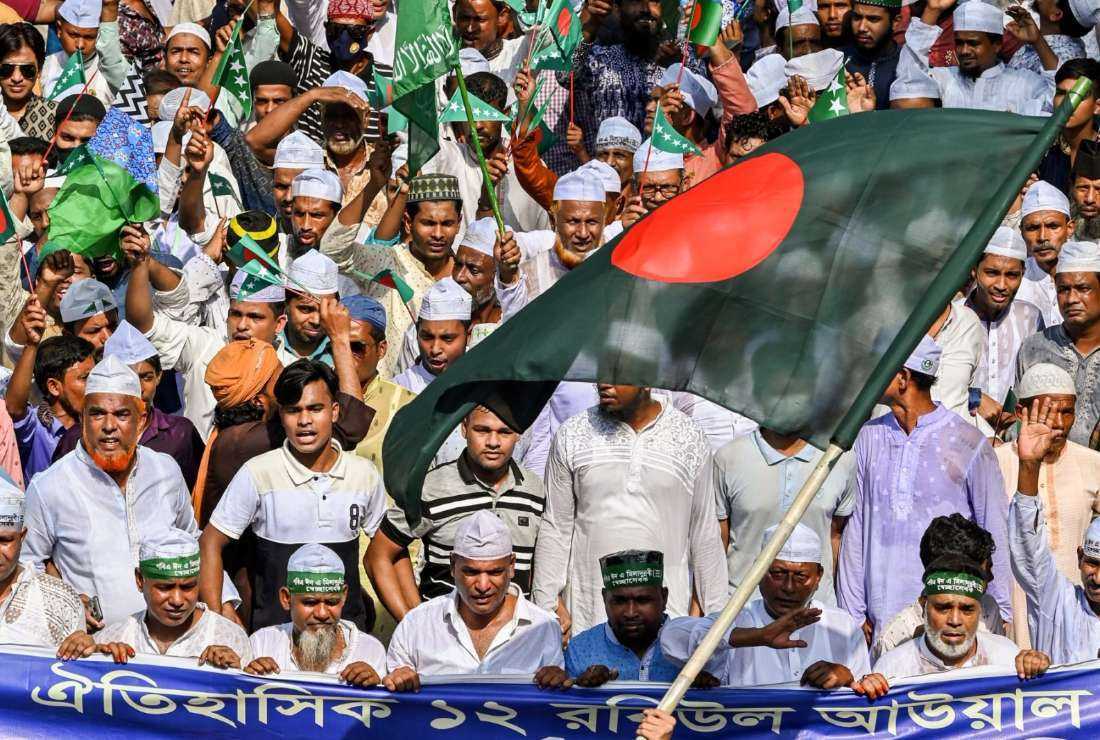
No justice for previous violence triggers communal attacks against minorities, rights group says

Muslim devotees carry a Bangladesh national flag as they take part in a rally to mark Eid-e-Milad-un-Nabi, the birthday of the Prophet Mohammad, in Dhaka on October 9, 2022. Minority Ahmadi Muslims have endured violence from radicals in the past decades. (Photo: AFP)
Bangladesh’s largest religious minority forum has criticized the ruling Awami League government for failing to protect Ahmadi Muslims from mob attacks, accusing it of tolerating Islamic radicals and making the country an increasingly dangerous place for minorities.
Islamic radical elements within the government allow “compromise with extremism and fanatics” and it leads to saddening communal violence that pushes the society “backward,” said Bangladesh Hindu Buddhist Christian Unity Council in a press statement.
The council reacted after hundreds of Sunni Muslims attacked minority Ahmadiyya Muslims in the Panchagarh district of northern Bangladesh on March 3.
The Ahmadiyya sect which originated in 19th-century British India is seen as a heretic sect by mainstream Sunni Muslims, a majority in South Asia.
At least two Ahmadiyya people died, 50 people were injured and 50 houses were burnt down allegedly after the mob attempted to stop an annual Ahmadiyya religious gathering in the town, close to the Indian border. The government deployed hundreds of police and border guards to quell violence.
Neem Chandra Bhowmik, a Hindu and a president of the council, told UCA News that such attacks against minorities continue because the government has failed to ensure security and religious freedom for all amid threats of extremism.
“Such communal incidents are happening because the government is not able to suppress the extremism that lurks in the government. We want freedom of every citizen to practice their religion, freedom of expression for everyone but the government is failing to ensure it,” Bhowmik said on March 7.
He alleged that ethnic and religious minorities continue to face abuses and violence in Bangladesh as justice was not done for a series of communal attacks in the past.
Shafiq Ahmad, 41, an Ahmadiyya Muslim and primary school teacher said that he lost his house and valuables worth 50,000 Taka (US$480) in the attack.
Ahmad said that his community has been attacked again because past cases of violence against them have not seen justice.
He said since the attack, Ahmadiyya people including women and children have been passing through hard times under the open sky and living in fear, without any relief measures.
“We demand that the government guarantees our religious freedom, to observe our religious ceremonies. Those who attacked us should be prosecuted. We do not want anything else,” Ahmad told UCA News.
In 2019, Ahmadiyya people in the same town came under attack from Sunni Muslims, leaving at least 25 injured.
Ahmadiyya sect is one of the 73 sects of Islam and it has about 20 million members in over 200 countries, according to the Ahmadiyya Muslim Jamaat of Canada.
Ahmadiyya people face attacks in several countries. In Pakistan, Ahmadiyya Muslims were declared “non-Muslims” by the state in 1984.
Islamic radicals in Bangladesh have repeatedly demanded Ahmadiyya sect be declared non-Muslim.
There were several mob attacks on Ahmadiyya gatherings and mosques over the past decades in Bangladesh.
Since 2013, when Bangladesh saw a rise in Islamic militancy, armed extremists murdered atheists, foreigners, liberal Muslims, and religious minorities including the Ahmadiyya sect before a heavy anti-militancy crackdown was launched.
Ahmadiyya Muslims in present-day Bangladesh trace their origins to the 1900s, when the country was part of British India, according to Human Rights Watch. There are roughly 100,000 Ahmadiyya Muslims in Bangladesh today.
A police official said since the violence 10 cases have been filed and at least 130 people have been arrested.
“The situation in the district is currently normal and under the control of police and law enforcement officers. Police and joint forces are working to nab more culprits,” S. M. Sirajul Huda, chief of Panchagarh district police told UCA News.
Human rights organization, Article 19, deplored the violence against the Ahmadiyya people and called on the government to ensure religious freedom for all as guaranteed in the country’s constitution.
“Ensure a tolerant environment based on the principles of all religions and beliefs of the United Nations so that people of all communities can practice their religion without fear and hindrance,” the organization said in a statement on March 6.
Help us keep UCA News independent
The Church in Asia needs objective and independent journalism to speak the truth about the Church and the state.
With a network of professionally qualified journalists and editors across Asia, UCA News is just about meeting that need. But professionalism does not come cheap. We depend on you, our readers, to help maintain our independence and seek that truth.
A small donation of US$2 a month would make a big difference in our quest to achieve our goal.

Share your comments